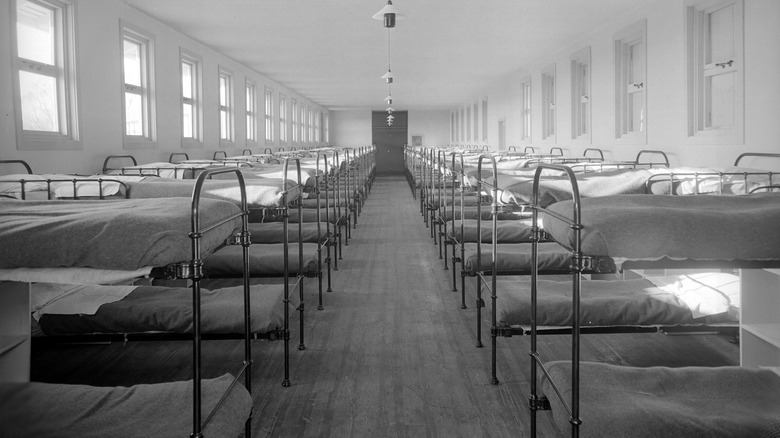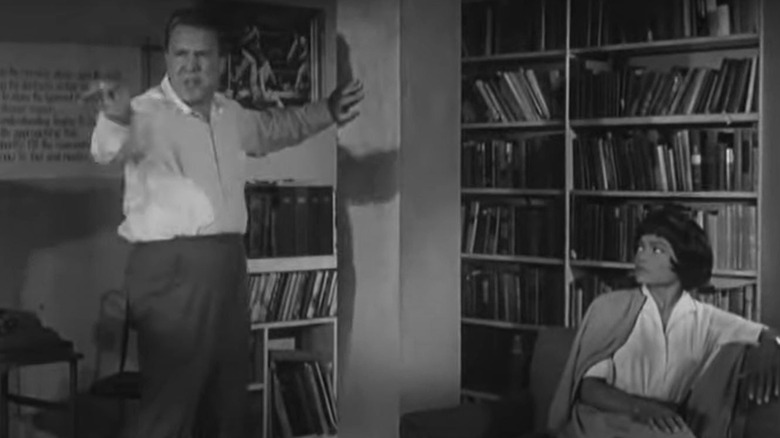Synanon: The Rehab-Turned-Cult That Inspired The Troubled Teen Industry
Not to be glib or anything, but what's going on with California and cults? Decades' worth of white-robed, often mysticism-and-sex-obsessed groups have arisen from the state's fertile New Age soil: Children of God, the Marcus Wesson cult, the Manson Family, and the recently exposed NXIVM, to name a few. Vanity Fair asks this exact question, pointing to the region's celebrity-and-wealth-inured culture as a contributing factor. The Atlantic does an impressively deep dive into the topic and concludes that California's very escape-to-the-outskirts geography plays a huge role in attracting the fringe-minded. There's even an entire industry of cult and cult-adjacent tourist sites built around this very unseemly history, as Atlas Obscura lists.
So if Synanon (pronounced "sin-anon," not "sign-anon") passed under folks' radar, it's understandable. Emerging in full-cult form in the 1970s — but with a unique slant — Synanon began as a therapeutic help center for drug treatment. Created in 1958 by founder Charles Dederich in "a dingy Santa Monica storefront," it transformed into a hotspot of violence and abuse with 1,300 members and over $30 million in assets before eventually collapsing and filing for bankruptcy in 1991 (per Los Angeles Magazine). Along the way the Dederich-led organization leveraged its "no-crap" therapy — a homebrewed, a-scientific mishmash of rhetorical gobbledygook treatment inspired by Ralph Waldo Emerson's poetry and aggressively confrontational methods, via Cabinet Magazine — into a template for the entire Troubled Teen Industry (TTI), per Breaking Code Silence. Dederich employed public humiliation tactics, poisonous rattlesnakes, forced sterilization, and much more.
Brainchild of a broken man
Synanon promised people experiencing drug addiction rehabilitation rather than imprisonment. In the 1950s, such people were largely written off as hopeless cases, and few talked about terms and concepts common to us nowadays: treatment plans, medical intervention, and so forth. Synanon was at the forefront of the "tough love" therapeutic movement, especially as related to one-on-one relationships between drug counselors and those they help. Such approaches can easily go overboard, though. As historian William White wrote in 1998 (via Los Angeles Magazine), "The failure to define and enforce clear ethical standards governing our business practices has long rendered the addiction treatment field a predator's paradise."
Charles Dederich was one such predator. Born in 1913 in Toledo, Ohio, Dederich came from a predictably broken background himself. Breaking Code Silence tells us that his father — who experienced alcoholism — died in a car accident when he was 4, his brother died four years later, and then his mother remarried someone whom he hated. Dederich developed an alcohol dependency during adolescence that left him 43 years old with a dead career, two failed marriages, and his only ticket to health: admission to Alcoholics Anonymous (AA).
But after only two years of treatment, Dederich left AA and formed his own substance abuse recovery program in 1958, Synanon. Whether he thought that he could do better or considered himself "fixed" after only two years, so to speak, Dederich drove Synanon to financial success, fame and acclaim, and a sadistic, twisted end.
After-hours AA tough love meetings
To be fair, Charles Dederich didn't jump from AA participant to cult guru overnight — Synanon and its tough love principles took root in Dederich's apartment. Dederich apparently had a knack for "keep[ing] people straight" and "bullying them into giving up the bottle," as Cabinet Magazine says. He plied other AA members to convene in his apartment with promises of soup, coffee, and no-nonsense talk. It's also possible that Dederich was living on welfare at the time. Even so, he was supposedly completely sober and must have taken on a potent, leader-like light to other substance-dependent individuals. As Dederich himself recounted, this time period filled him with "feelings of omnipotence and omniscience," which generally isn't a good sign.
As soon as Dederich rented an abandoned store and dubbed it Synanon — a name without clear origins, as Breaking Code Silence explains — he charged an unbelievably modest sum for a full two years of residential treatment: $33 dollars, or about $343 in 2023. As a result, he gathered people experiencing addiction of all stripes to his modified 12-step program: dropouts from other programs, those with intellectual disabilities, those court-mandated to seek help, and more. Participants were required to get 100% clean before joining the program, and that included ditching prescription medication. For the first 90 days of treatment, contact with the outside world was completely cut off. During this time, participants suffered their first abuse and indoctrination via what would eventually be dubbed "The Game."
The coolest corporation in the world
This is where the story of Charles Dederich and Synanon turns disturbing. As Breaking Code Silence states, group therapy sessions at Synanon reportedly began in almost stereotypical fashion, with members circling up and talking about their feelings. But per Dederich's methods — i.e., the rules of The Game — other members of the circle were ordered to mock and verbally abuse the person who spoke up. Vulgarity and coarse language were encouraged under the axiom "talk dirty and live clean," as Cabinet Magazine describes, like calling one 1962 participant "a lousy dope fiend mother." That's extremely mild, though — we're talking full-on shouting and barrages of obscenities that can't be repeated here. "The first time it hits you, it absolutely destroys you," one participant recalled, with another adding, "No matter how loud you scream, they can scream louder."
The Game was just the start. Synanon enforced mandatory chores using a peer-to-peer "get off your a**" system, offered perks like free sandwiches and cigarettes, and hosted actual art, drama, and jazz classes — some musicians even collaborated on a 1962 album, "Sounds of Synanon." Synanon's reputation ballooned overnight. It was edgy, hip, and as the trailer for the 1965 movie "Synanon" says, "the coolest corporation in the world." Individuals and companies started donating millions of dollars to Synanon, and Dederich's ego ran amok. "I am considered a megalomaniac nut," Cabinet Magazine quotes him, continuing, "Of course, this is true, but I'm not so crazy."
The rise of a violent cult
At this point it might be easy to see how Synanon metastasized into an all-out cult. It's got all the right ingredients: a worshipped leader, an insulated community, its own internal rules, etc. But after Charles Dederich poured root beer over a disobedient participant's head, things went off the rails. As mildly violent as that gesture might seem — conducted against a member of the "Punk Squad," a rowdy group of Synanon participants — it set a precedent for physical violence that quickly turned into full-on beatings, per Cabinet Magazine. It wasn't long before Dederich broke up families with Synanon, separated parents from children, and made abortions mandatory.
Dederich then went one step further and instituted his "Imperial Marines," an internal police force trained in "Syn-do," a self-made martial art. They patrolled the grounds of Synanon and amassed over $300,000 worth of firearms "if trouble should occur," as Los Angeles Magazine says. At the same time participants were required to shave their heads, wear uniforms, and Dederich started preaching an apocalyptic, fear-based, us-them message. By 1972, Synanon started merchandizing its image in the form of pens, T-shirts, and the like, and gobbling up property across the U.S., Cabinet Magazine reports. Hot tubs, horse-riding stables, and a private jet: these were but a few of the luxuries afforded Synanon's elites, including Dederich and his wife. And when NBC and Time magazine started doing exposés on Synanon, Dederich turned violent against the outside world.
A swift intervention and a swift end
"We're not going to mess with the old-time, turn-the-other-cheek religious postures. Our religious posture is: Don't mess with us — you can get killed dead, literally dead! ... I am quite willing to break some lawyer's legs and next break his wife's legs and threaten to cut their child's arm off. That is the end of that lawyer. That is a very satisfactory, humane way of transmitting information. ... I really do want an ear in a glass of alcohol on my desk. Yes indeed." So Cabinet Magazines quotes Synanon founder Charles Dederich in 1977 one month before LA attorney Paul Morantz, intent on freeing captive Synanon members, found a live rattlesnake in his mailbox. He survived, but barely. Dederich's minions then hanged the dog of an executive who spoke out against Synanon. Around the same time a former Synanon member was tied to a post and pistol-whipped, and two Imperial Marines — along with Dederich — were charged with conspiracy to commit murder (they later pleaded no contest, per The New York Times).
Unlike some other cults, authorities didn't take long to intervene. Spurred by Jim Jones' 900-person 1978 mass suicide in Jonestown, Guyana, authorities busted down the Synanon door mere days later. Dederich was found on a Synanon property in Arizona, stone-cold drunk. As Breaking Code Silence says, it took until 1991 for the organization to completely shut down. No matter the lasting impact of Synanon on the confrontational therapeutic techniques of the Troubled Teen Industry (TTI), as Mother Jones outlines, Synanon's poisonous influence was at least cut short.
If you or anyone you know needs help with addiction issues, help is available. Visit the Substance Abuse and Mental Health Services Administration website or contact SAMHSA's National Helpline at 1-800-662-HELP (4357).





